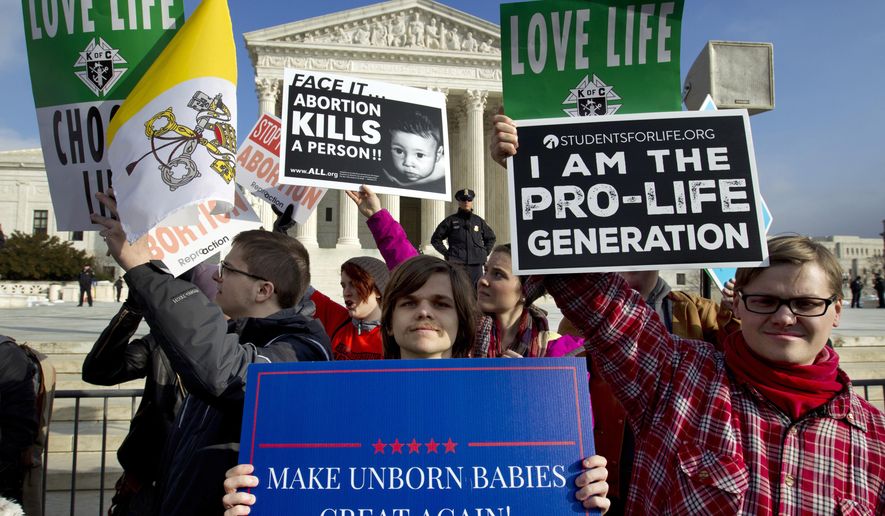The spate of new abortion restrictions in Republican-led states is pushing national pro-life leaders to call for a rethink in how they frame the issue, calling into question the old exceptions for rape and incest.
Kristan Hawkins, president of Students for Life of America, said she started to rethink things after a friend challenged her on whether she was being philosophically consistent by accepting those longstanding exceptions.
“We know that when we talk about the humanity of the child and the child having limitless potential and worth, that your potential and your worth doesn’t change because of the circumstances of your conception,” Ms. Hawkins said. “That’s actually a really scary slippery slope to take when you start saying certain people have more worth than others.”
Ms. Hawkins helped lead a recent letter to Republican National Committee Chairwoman Ronna McDaniel asking for a meeting to talk about the GOP’s position.
Many Republicans have for decades called for abortion to be made illegal, with exceptions for cases of rape, incest or where the pregnant person’s life is endangered.
Ms. McDaniel has said, in response to the new restrictive laws in states such as Alabama that have dropped the rape and incest exceptions, that she supports those carve-outs.
Ms. Hawkins and about 20 other pro-life leaders asked Ms. McDaniel to ponder the messages being sent by these hard-case exceptions.
“As a crime, rape and sexual assault must be handled with the full force of the law,” they said in their letter. “But a child conceived in rape is still a child. We don’t blame children for other matters outside their control. Why should we do so here?”
Other signatories to the letter include representatives from the Family Research Council, the March for Life Education & Defense Fund, Human Life Alliance, and Priests for Life.
Tony Perkins, the president of the Family Research Council, acknowledged that even apart from GOP stances and rhetoric, abortion policy has recognized these exceptions for decades and that he wouldn’t jump on any of his “friends” who say they favor these exceptions.
“But I think this is a moment in time which we can have the discussion to be, I think, logically consistent in our view of life,” he said. “The means of conception — does that determine the value of a life? I mean, if it’s artificial insemination, does that mean it’s not life?”
The exceptions developed at the national level as part of a compromise in the 1970s, after the Supreme Court’s 1973 Roe v. Wade ruling establishing a national right to abortion.
Congress decided that taxpayers wouldn’t be asked to fund abortions, bowing to pro-life beliefs, but there could be exceptions for the toughest cases involving rape, incest and instances where the pregnancy risked the mother’s life.
Ms. Hawkins said she has friends who were conceived in rape who have been “dehumanized” on social media in recent weeks, and she wants them to have a broader platform to tell their stories.
“That’s how these positions evolve on this issue,” Ms. Hawkins said. “I met someone who had been conceived in rape and that totally changed my thinking.”
Ms. McDaniel, in a statement to The Washington Times, said the GOP respects those who fight for the unborn.
“We are the party of life, and as RNC Chair, I welcome any discussion about how to protect it,” she said. “This stands in direct contrast to the Democrat Party, which has stated that there is no room for pro-life voters in their ranks.”
Ms. Hawkins said the advocates didn’t necessarily choose the timing for the push, which was spurred by states, “but now that it’s out there, I can’t in good faith not talk about this issue.”
Reporters on Capitol Hill have peppered Republican lawmakers with demands to know whether they agree with Alabama’s law, which forgoes the rape and incest exceptions.
House Minority Leader Kevin McCarthy said that for him personally, the Alabama law goes too far and that his position is in line with the views held by both President Trump and former President Ronald Reagan, who favored the exceptions. But Minority Whip Steve Scalise said that when he was in the Louisiana legislature he supported anti-abortion legislation that only had exceptions for when the life of the mother was in danger.
“I am strongly pro-life and I do believe we ought to try to protect life at every stage and that is why protecting the life of the mother was an exception I’ve always supported,” he said.
He said Louisiana may be the most pro-life state in the country — a view that was bolstered last week when Gov. John Bel Edwards, a Democrat, signed a ban on abortions after a fetal heartbeat is detected. However, at this early point in pregnancy, many people are unaware they are pregnant.
That law does not have exceptions for rape or incest. The legislation won bipartisan support and was sponsored in the state Senate by a Democrat.
“Even though I know there are horrible crimes that are committed with rape and incest the child should not be killed and terminated because of the crime of the father,” said GOP state Rep. Valarie Hodges, who sponsored the measure in the House.
Democrats, meanwhile, said failing to include the exceptions would be a new act of cruelty against a woman who had already suffered abuse. The Louisiana House voted down an amendment that would have allowed for the rape and incest exceptions.
“I am not man enough to tell a woman who has had her insides ripped apart and been raped — I’m not man enough to tell that woman, ’You know what? Live with it,’” said Democratic state Rep. Ted James.
• David Sherfinski can be reached at dsherfinski@washingtontimes.com.




Please read our comment policy before commenting.